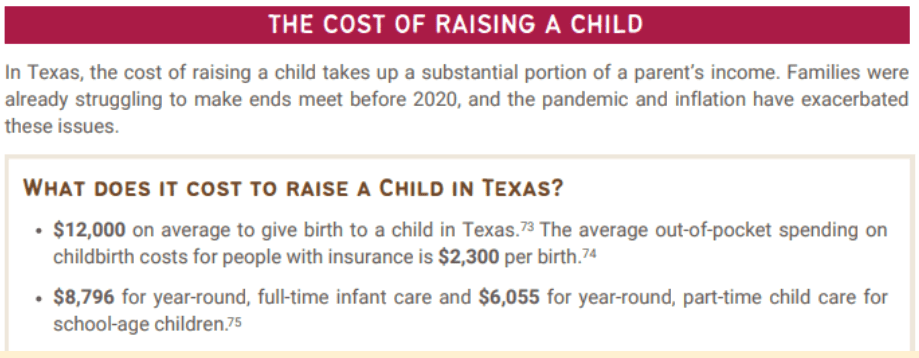All of us depend on a robust economy, so all of us need a childcare system that ensures parents can find care when and where they need it. It benefits everyone when parents can work to support their children, knowing that they are safe and cared for while on the job. Yet, our nation’s care infrastructure is broken, and both the numbers and stories affirm this to be true. Strong Nation’s recent study and report estimated that Texas loses $11.4 billion yearly due to childcare challenges that cause parents to miss, quit, or scale back on work. On a national scale, the U.S. economy loses $122 billion yearly for underinvesting in our nation’s care infrastructure.
Inadequate investments in our children will certainly impact our state’s workforce. The 2023 Annie E. Casey Kids Count Data Book reports that in 2020-21, 12% of Texas children under five lived in families in which someone quit, changed, or refused a job because of problems with child care. Lack of access to affordable and quality child care impacts the trajectory of all family members. If parents cannot secure child care, their economic mobility is impacted, and so are the resources and opportunities their children can access. It is also important to highlight that many working parents are not working traditional 9-5 schedules. Many parents are working multiple part-time jobs, including weekends and weeknights. According to a study by the University of Texas at Austin, in 2022, only 0.1% of licensed centers in the state offered care on Saturday and Sunday. Children with parents working nontraditional hours are also more likely to be Black, Hispanic/Latino, or immigrant and face multiple structural barriers. Locally, a study by the Urban Institute found, in Austin/Travis County alone, that an estimated 18,000 children are living with parents working nontraditional hours and only about 2,000 regulated childcare slots are licensed to provide care for these schedules.
Texas must not position families for economic immobility. A Texas mom who participated in the aforementioned study summed up the dilemma that a broken care system creates: Sometimes, it feels like I’m choosing between my kid and my career. I don’t really want to work as a [low-paid job in a caring profession], but it’s one of the only things that works with my daughter’s schedule.

A broken infrastructure of care will continue to impact Texas children’s health and education outcomes. The 2023 Data Book shows dismal gains in 4th-grade reading proficiency levels. In 2009 72% of Texas 4th graders were scoring below proficiency in reading. Over a decade later, that number barely budged, reaching 70% of Texas 4th graders scoring below proficiency. In math, the percentage of Texas 8th graders who scored below proficient in 2009 was 64%. Fast forward to 2022, and that number has increased to 76%. This huge increase in Texas students scoring below proficiency in math is startling but not shocking, given the state’s lack of adequate funding for public schools.
Success in school will undoubtedly come with more challenges for Texas children experiencing the compounded obstacles of a system running on the legacy of discrimination and racism. The long-term effects of the experiences of early childhood are researched and well-documented. We must invest in children early.
In Texas, 20% of children were living in poverty in 2021. Most children living in poverty were Hispanic or Latino children (66.3%) and Black children (16.1%). The cost of care burdens families, especially those living at or below the federal poverty line. The failings of a broken childcare system will mean investing in access to child care for working families, improving access and quality of child care, and lowering the barriers to entry for potential providence by increasing access to start-up and expansion capital, especially for entrepreneurs of color. Lastly, a critical part of ensuring that all Texas children will succeed in school and beyond will be by enhancing the economic mobility of their caretakers, many of whom are childcare workers. Childcare workers in Texas earn a median hourly wage of $11.31 per hour, less than the median national hourly wage for customer service and retail workers.
The state cannot continue to ignore the failing system of care and the conditions that lack of investment will perpetuate, including inequitable outcomes across health, education, and well-being. This year, the Annie E. Casey Foundation is calling on our elected officials to act on behalf of children and working families. At Every Texan, we are committed to ensuring that all children, regardless of race, ethnicity, gender identity, or socioeconomic status, have equitable access to the opportunities that will propel them into a future of success. We encourage partners, legislators, and community leaders to continue the work of advocating for a better Texas for us all.
The 2023 Annie E. Casey Foundation’s Kids Count Data Book is now available via this link. You can also view more data on Texas children’s well-being here.
